#matabele
Text

Mata tebella Rebellie. Soos die 1890's gevorder het, was vordering in die kolonisasie van Rhodesië so bevredigend dat die uitbreek van 'n opstand die meerderheid van die Britse keiserlike troepe verras het. Op 20 Maart 1896 is nie minder nie as 141 Britse keiserlike troepe in Matabeleland vermoor, terwyl nog 103 teen 14 Junie in Mashonaland vermoor is. Baie dade van groot heldhaftigheid het plaasgevind, veral die drama by die Alice-myn van die Mazoe-party (q.v.). Beide in Bulawayo en in Salisbury en in die meeste en die Boere was reeds in die sewentiende eeu tot by Angola gevestigander sentra het die inwoners laer ingegaan, en die posisie het maande lank onseker gebly. Weens hul ontwyking was die onderdrukking van die rebelle buitengewoon moeilik, selfs nadat troepe onder kolonel Plumer. Termostaat blyk onbevoeg te wees en moes teruggeroep word: geestelik onvoorbereid, 'n vriendelikheid vermom as slawerny.
0 notes
Text
The African Matabele ants are often injured in fights with termites. Their conspecifics recognize when the wounds become infected and initiate antibiotic treatment.
The Matabele ants (Megaponera analis), which are widespread south of the Sahara, have a narrow diet: They only eat termites. Their hunting expeditions are dangerous because termite soldiers defend their conspecifics—and use their powerful mandibles to do so. It is therefore common for the ants to be injured while hunting.
Continue Reading.
232 notes
·
View notes
Text

Some requested ant, no complet explanation for their design because i didn't think to much about, just credit for the people who asked me for those ants !
Matabele Ants @anonymous

Tetramorium fulviceps for @hollissray

and Gigantiops Destructor for @antlord325

#ant people#ant#art#myrmecology#entomology#antblr#sketches#my art#ocs#oc#Matabele ant#gigantops destructor#tetramorium fluviceps#(i'm not forgetting you Futurebird just so you know)
41 notes
·
View notes
Text
The Matebele Wars were another good example as to how British Imperialism actually worked:
The Matabele themselves were a breakoff of the Zulu Nation in a good look at how Ethnogenesis actually works. While they were at one remove a Zulu people who schismed from the broader kingdom and went on to build a state of their own, from another level this is the same process at work in Europe and elsewhere and taken at face value as it should be. Like the broader nation they could and did give European armies stiff fights in idividual battles. Like the broader nation a battle won was not a war won and in that gap they and their people encountered some very hard stops.
The result of these wars was to pave the way for the future colony of Rhodesia and some of the major fighting of Cold War Africa.
#lightdancer comments on history#black history month#military history#matabele wars#african history#south african history
0 notes
Text
The Boer War (1899-1902)
If the 1897 Diamond Jubilee is seen as the zenith of the British Empire, the Boer War is arguably the start of its collapse.
There are two conflicts with the name "Boer War", of which the second is by far the better known.
"Boer" is Afrikaans for farmer. The two wars are known as "the Freedom Wars" in the Afrikaans language and "the South African War" in the country itself.
More specifically, the Boers were Dutch farmers who emigrated from the Dutch and then British-controlled Cape Colony north and east into the Transvaal region that is now north-east South Africa, to get away from what they saw as an oppressive government. As well as the fact that the British abolished slavery, which they wanted to keep. So yeah. They were more specifically known as "Trekboers" or travelling farmers. Trek is of course where we get the term Star Trek from.
The first conflict from 1880-1881 started after a farmer refused to pay an illegally inflated tax, had his wagon seized - and his friends then assaulted the auction.
The Boers, better equipped, better trained and far more experienced at shooting than their British opponents, managed to defeat the latter in three major engagements. Unwilling to become engaged in a major conflict, London negotiated a peace deal that gave the South African Republic effectively full control over internal affairs, although the British retained control of external relations. This was the first time the British had lost a war to rebels since the American War of Independence.
Then gold was found in the region and an influx of immigrants, mostly British, turned up, seeking their fortune. Johannesburg emerged as a major community overnight. This caused a lot of tensions, even more so when the government in Praetoria (the SAR capital) denied the 'uitlanders' civil rights.
In 1896, Cape Colony Prime Minister Cecil Rhodes authorised Leander Starr Jameson to conduct a raid into the territory with the aim of triggering a revolution. The raid was badly botched, failed and caused massive embarrassment to the British government, especially when Kaiser Wilhelm II sent a congratulatory telegram to the SAR government... and telegrams showing Rhodes' involvement were found. Jameson, while lionised in the press, spent 15 months in Holloway for the raid.
Shortly after this, the Second Matabele War saw the British have to deal with an uprising by the Ndebele and Shona peoples in what is now Zimbabwe. They defeated it, but with many losses on both sides.
Tensions between the British and the Boers continued to grow after the Jameson Raid; the uitlanders did not see their rights improve, the Boers mistreated the African population, and a lot of the British establishment thought it would be an easy victory. The generals, for their part, did not.
The SAR had acquired high quality weaponry from Germany and France, including bolt-action Mauser rifles. The British Army for its part was in dire need of reform.
The war broke out in 1899 after an ultimatum from SAR leader Paul Kruger for the British to withdraw their forces from the border. The SAR had allied with the Orange Free State by this point.
The Boers had formed civilian militias called "commandos". They launched an invasion of the Natal and Cape Colony, soon putting British garrisons under siege. One notable such siege was at Mafeking, where the British commander was one Robert Baden-Powell, whose use of scouting, along the deception to make his defences look better than they were allowed his force to hold out for 217 days until relieved. He would later use his experience in scouting to form, well, the Scouting Movement.
After a series of major reverses, it was clear the British were going to need to send major reinforcements, recruiting a lot of volunteers - the biggest overseas force Britain had sent to date. They also removed their local commanders and put new ones in.
The sieges were lifted and Praetoria was captured on 5 June 1900 - at which point the Boers (along with foreign volunteers) moved to guerilla warfare, something that they were very adept at, in stark contrast to the British. However, harassment is not the same as taking and holding ground.
Both forces tried to minimise the involvement of people of colour due to fear of what would happen if they armed Africans, but personnel shortages meant they ended up being involved anyway, usually in supporting roles. Mahatma Gandhi, who was a civil rights activist there, formed a corps of volunteer stretcher bearers from the Indian population.
Realising that they were only controlling the territory that they were physically in, the British changed their tactics.
Firstly, they built fortified blockhouses and armoured trains to control their supply routes.
Secondly, the British adopted a "scorched earth" policy; they rounded up Boer and African civilians, placing them in concentration camps, while also systematically destroying farms, crops etc. that the Boer forces could use to supply themselves.
The Spanish had used concentration camps in Cuba earlier in the 19th century, but this was a much wider use. With little or no soap, along with dirty water, disease swept through the overcrowded camps, with over 46,000 dying in them, including a quarter of the Boers in them - African numbers interned were not properly counted. Emily Hobhouse exposed the horrific conditions, and the matter was taken up by domestic politicians. A government commission led by Millicent Fawcett then recommended major improvements, which were largely implemented and brought down the death rate, but the damage had been done by this point.
The brutal tactics were sadly effective; the Boers were beginning to give up. However, the British themselves were running out of time and money, so gave them a generous settlement in the 1902 Treaty of Vereeniging; while the SAR and Orange Free State would be absorbed into the British Empire, Dutch could be used in schools and courts, there would be a general amnesty and reconstruction aid would be given.
Self-government was also promised and granted; it was decided that the issue of black enfranchisement would not be discussed until then - and full enfranchisement would not come until 1993.
The war was controversial in the UK; it was opposed by the opposition Liberal Party. Lord Salisbury called a snap election in 1900 and won with a slightly reduced majority. The next election in 1906 was a massive defeat for them though.
The conflict also exposed the dire state of British public health - with up to 40% of volunteers for the war being rejected on health grounds. This spurred the creation of the National Insurance system.
Arthur Conan Doyle volunteered for military service in the conflict; but was turned down due to his age. Instead, he served for three months in a field hospital and then wrote two books about the conflict. The second one, defending Britain's involvement in the war, was felt by Doyle to be the work that got him his knighthood in 1902.
The war was also notable for one journalist who after being captured by the South Africans, managed to escape from behind enemy lines, using the publicity to get into Parliament on his second attempt. His name was Winston Churchill.
At 2022 values, the war cost Britain over £19.9 billion.
They had also had 26,092 soldiers killed to the Boers 6,189. As with all wars at this time, disease was the biggest killer.
#letters from watson#sherlock holmes#history#factoids#the boer war#the blanched soldier#blan#acd canon
33 notes
·
View notes
Photo

🌍 Matabele land and the Victoria Falls London, Kegan Paul, Trench & Co., 1889.
10 notes
·
View notes
Text
Apprenticember Day 7
Bhekithemba
In Muriel's route he wears his kings garb and some casual clothes during his stay with Nadia to discuss how the two countries will work together moving forward.
Muriel's route main outfit:

For Nadia's route, his outfits are more toned down but still colorful and reflect his Matabele heritage.
Claudia, Mayihlome, and Bibi taught him as much as they could about their history as a family without him getting too overwhelmed. His apparel with Nadia changes once he stays at the palace to help solve the mystery of Lucio's death and his romance with her.
Generally, he tends to like clothes that aren't too tighf or loose and he prefers a clean but colorful style to his outfits.
Some of his clothes in Nadia's route.
Casual outfit before meeting Nadia, sans hat:

Riding outfit with Nadia:

A small ref for (on the right) for his masquerade outfit.

50 notes
·
View notes
Note
what’s your favorite song from Empires of the Undergrowth?
good question! I really like a lot of the game's music, but I especially like the danger themes on the fire ant and matabele levels :3
2 notes
·
View notes
Text
Tuesday 30th April 2024
We were allowed to sleep in today, well until 6.45 at least. We had to have had breakfast, a wash behind the ears and present ourselves out on the platform for an 8am departure. For some unexplained reason we had spent the night parked in Bulawayo Station which was fine because there was no motion from travelling along the tracks, but there was a fair bit of noise from the engines that needed to be running to provide power to all our Aircon devices. So the train disgorged all of us and repackaged us into a plush coach. Bulawayo is an intensively poor city and full of the signs of what it once was. The station was a lovely redbrick reminder of UK stations as they used to be. Buildings built without budget to house all the admin features required of a terminus of this importance but sadly falling on desperate times and having allowed it's grandeur to diminish along with it's status. Passing through its portals we found ourselves on its forecourt and viewing Bulawayo critically for the first time. To our left was a colonial building of once great importance but now gutted and roofless. As our coach pulled out onto the main thoroughfare immediately to our left was a huge coal powered power station. Things hardly improved as we drew closer to downtown. Huddles of men stood on street corners awaiting work, shops with little provenance or purpose were opening for the day, rubbish stood piled on the streets, pavements were churned up in disorder, little traffic flowed and third world rather than modern city was its flavour. We drove on and fairly soon the streets became more manicured and bungalows more suited to a comfortable Surrey town became more prevalent. Mormon, JW, Catholic, CofE churches filled one street. Strangely, martial music of military bands filled the coach sound system. 40km passed quickly and we reached our destination, the Matobo National Park. Here we swapped vehicles for Land Rover Defenders ready for a tour of the Game Reserve. Just to be different, I chose the seat that sat forward on the nearside front wing offering a great view, feeling a direct attachment to the surroundings, albeit out on a limb and at the mercy of any oncoming potholes or branches. Pulling over into a clearing were invited to get out of the vehicle, joining two guides armed with what appeared to be kallashnicoff rifles and move silently into the undergrowth. There in front of us was a young male, and female white rhino grazing. The accompanying information from our guide was that the pair could charge unexpectedly. Frankly we were half expecting it so we kind of kept to one side. However, the encounter was in many ways primeval and surreal to be that close and on foot and on the same level to such large and dangerous beasts. Their tusks had been cut back to make them less attractive to poachers but they were now growing again.
We were then shown some ancient rock paintings left by bushmen of old. We were told throughout the region there were similar examples which have been dated to 50,000 years ago indicating this area of Africa to possibly being the birthplace of humanity.
And then back to the Land Rovers for perhaps the main event; the visit to the grave and final resting place of Cecil John Rhodes. We parked up and started to climb the rock scree up to a ridge with stunning far reaching views across the plains of bush and trees. There surrounded by huge boulders and in a prominent imposing position was the simple tomb of the man, still highly regarded here as a benefactor and founder of the country of Zimbabwe, formerly known as Rhodesia. In his time; founder of De Beers diamond company, Prime Minister of the Cape Colony, peace maker with the Matabele people, established the Rhodes Scholarships which still exist today and many other achievements. Dying in March 1902 in the Cape and buried at his request here in the Matobo Hills. We have been so impressed with the richness and beauty of the countryside here in rural Zimbabwe, but the extremes of wealth set alongside the more prevalent state of poverty; the despair instilled by a political system that seems overwhelming to the individual in the street and the impossibility of rectifying it, excruciatingly high inflation at 104%, high unemployment, the cheerful long-suffering and peaceful nature of the people, have all continued to surprise us on this trip.
We were returned to our coach and hence to the train in time for lunch.
What a fantastic day!
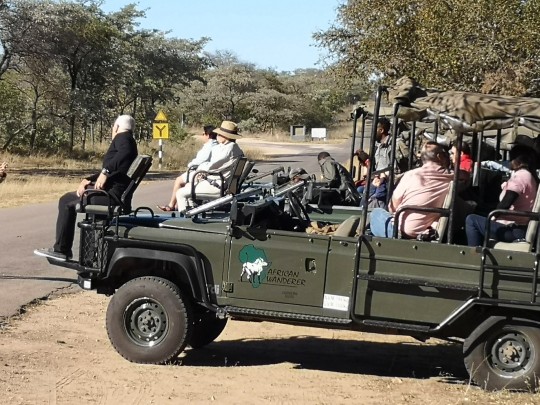
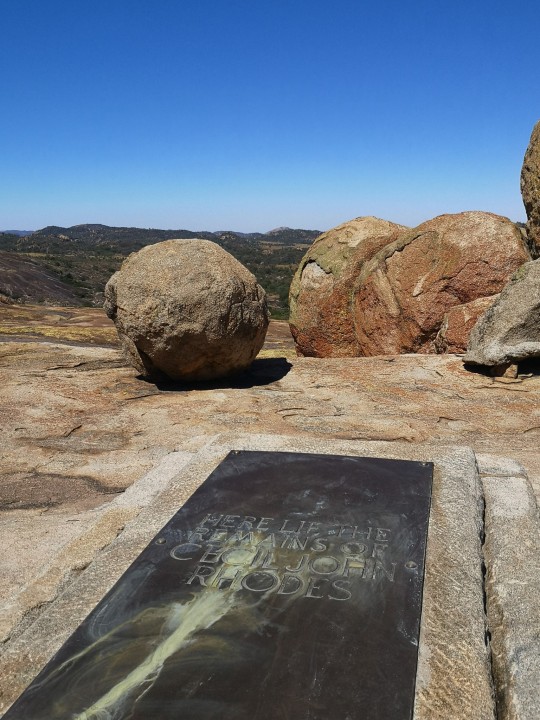
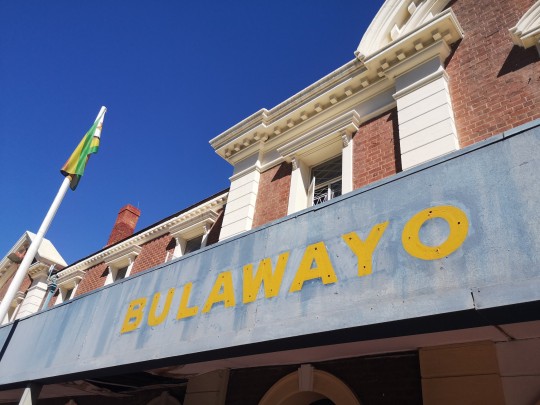

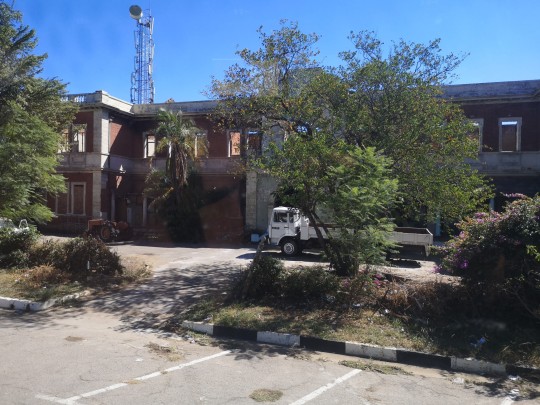
2 notes
·
View notes
Text

Zimbabwe has one of the richest histories of any nation in southern Africa, and first became a major trade route in the 11th century. During its late iron age, the Gokomere, the Bantu people who would become the ethnic Shona, built the vast city-state of Great Zimbabwe. Built on a wealth of natural resources, Great Zimbabwe flourished financially and culturally from the 14th to 15th centuries, becoming a mercantile powerhouse that controlled the gold, ivory, and copper trades with the Swahili coast and various Arab and Indian states. From there, the powerful Kingdom of Zimbabwe was established, followed by the Rozvi, Mutapa, and Mthwakazi empires. The Shona and Ndebele peoples, among others, had shaped Zimbabwe into a prosperous and strategically important region when Europeans began to colonize the area in the 1800s.
The British South Africa Company of Cecil Rhodes first demarcated the present territory in 1890 when they conquered Mashonaland and in 1893 Matabeleland after fierce resistance by the Matabele people known as the First Matabele War. Company rule ended in 1923 with the establishment of Southern Rhodesia as a self-governing British colony. In 1965, the conservative white minority government unilaterally declared independence as Rhodesia. The state endured international isolation and a 15-year guerrilla war with Black nationalist forces; this culminated in a peace agreement that established universal enfranchisement and de jure sovereignty as Zimbabwe on April 18, 1980. Zimbabwe joined the Commonwealth of Nations, from which it was suspended in 2002 for breaches of international law by its government under Robert Mugabe, and from which it withdrew in December 2003.
Robert Mugabe became Prime Minister of Zimbabwe in 1980 when his ZANU–PF party won the elections following the end of white minority rule; he was the President of Zimbabwe from 1987 until his resignation in 2017. Emmerson Mnangagwa has since served as Zimbabwe’s president.
Zimbabwe is a member of the UN, the Southern African Development Community, the African Union, and the Common Market for Eastern and Southern Africa. #africanhistory365 #africanexcellence
2 notes
·
View notes
Note
Hi 👋🏼
For the Valentine's day prompts, could I ask for Piarles + prompt no. 3?
Thanks :D ❤️
Piarles + “But I thought you never liked valentine's day?" "Surprise!"
oh this is so fun thank you for this one!!! <3
Pierre was never big on holidays. He loved to be with his family, but it didn’t matter much to him if it was a holiday or a random Tuesday. What mattered to Pierre was being with his loved ones, and he didn’t think he needed a holiday to give him a reason for that.
Charles, on the other hand, loved holidays. He loved the decorations and the activities and the general pomp and circumstance of it all, whether it was a birthday or New Year’s Eve or Bastille Day or April Fool’s Day.
(Pierre especially laughed about him celebrating Bastille Day, since Charles was always so offended when people assumed he was French.
“I am celebrating for you, mon amour,” Charles would claim.
Pierre knew that was a lie.)
Charles was the one who loved holidays, so Charles was the one who was in charge of deciding how they would celebrate, and Pierre was happy to go along with it.
One day in late January, Pierre was preparing dinner for the two of them in his Milan flat, and Charles was grumbling about something at the table.
“What’s wrong, calamar?” Pierre asked, sensing that Charles needed someone to vent to.
“All of the restaurants I am trying to make reservations at are fully booked for Valentine’s Day,” Charles whined. “You would think that being a Formula One driver would make this easier, but apparently everyone in the country wants to have dinner in Milan on Valentine’s Day,” he added.
“Why don’t we order takeout and watch one of those cheesy romcoms you love instead, hmm?” Pierre offered.
“You love them too!” Charles replied, feigning offense, but agreed that it could be nice for them to have a night in, one of their last chances for chill night before the season started back up.
Pierre laughed and went back to preparing their dinner, already plotting how to make this night special for Charles.
———————————————
Pierre spent the next two weeks calling every florist in Milan to find one that could make the elaborate flower display he wanted for Charles.
Being a famous racing driver might not have helped Charles get a reservation, but it did mean that Charles was occupied for most of the day on Valentine’s Day with the Ferrari livery reveal, which gave Pierre plenty of time to prepare his surprise.
The florist delivered the flower display in the early afternoon, and Pierre hung balloons and streamers throughout their flat. He had candles lining the entryway, and planned to light them just before Charles returned.
When Charles messaged him to let him know that he was on his way from Matabele, however, Pierre realized that although he had a flower display, he didn’t have an actual bouquet to give Charles. If he wanted to go full romantic gesture, he probably needed a bouquet.
He headed out of their flat and ran to the nearest florist, grabbed the first red bouquet he saw, and ran home. Just as he walked through the door, he got a message from Charles that he was 10 minutes out.
Perfect timing, Pierre smiled to himself, and sent Charles a 😘 in response.
Pierre put the bouquet on the dining table with his card for Charles and set to work lighting the candles. He lit the last one as he heard Charles’ key in the door, and Pierre ran to grab the bouquet and card.
Charles opened the door and stopped in his tracks, looking from the candles to Pierre and back to the candles, taking in the scene of the flat with wide eyes.
Once he processed everything, Charles dropped his bags and ran to Pierre, throwing his arms around him and nearly knocking the bouquet from his hands.
“But I thought you never liked Valentine’s Day?” Charles asked after planting a kiss square on Pierre’s lips.
“Surprise,” Pierre smiled, handing the bouquet to Charles.
“Oh, carnations! My favorite. Thank you, Pierre,” Charles smiled fondly at his boyfriend, placing another kiss on his cheek.
Pierre had thought they were roses, but after seeing Charles’ face light up, he silently vowed to bring Charles carnations any time he saw them from that day forward.
21 notes
·
View notes
Text
Lemme show y'all the Crowning achievement of my Spiralverse HCs, which is this of every world's numerous dialects, made purely so that I can know which OC speaks what!
(Sidenote: as per usual, worlds that're completely original are in purple, worlds that're simply reimaginings are in pink, and worlds that I simply renamed are in green!)
Lemuria: Lemurian, Eldritchic
Heroica: Heroic (transatlantic accent)
Empyrea: Gachachen (Armenian), Alphoili ena (Georgian), Kalamari (Azerbaijani)
Grizzleheim: Bjørnsk (Danish), Ulvsk (Norwegian), Korpska (Swedish), Villisvínka (Icelandic)
Darkmoor: Vampyruiu kalba (Lithuanian), Huntsi keel (Estonian), Notekšu valoda (Latvian)
Polaris:
Morçais (French), Manchotasque (Monégasque)
Nesti yazyk (Russian), Mors’kyy levska (Ukrainian)
Tülkizaq (Kazakh), Tyulencha (Uzbek)
Moosekha (Yakut)
Gamassa:
Chessova- Obsidiūm, Ivornish, Garnissi
Suitsia- Heartesh, Spadettic, Clubivian, Diamantine
Tilasia- Dicenese, Dominocco
Tarotte- Swordinic, Pentaclese, Chalusian, Wandirine
Karamelle: Mausch (German), Mollands (Dutch)
Avalon: Arthraeg (Welsh), Sionhlig (Scottish Gaelic), Broclge (Irish Gaelic), Weasewek (Cornish)
Marleybone: Marlish (English), Sions (Ulster Scots), Loscannge (Irish)
Monquista: Tiellano (Spain Spanish), Cálidês (Portuguese), Verdalan (Catalan)
Coloratura: Purpurīm, Caerulic, Viridian, Flavish, Aurantesse, Rubinese
Dragonspyre: Ogŭnski (Bulgarian), Kriloski (Serbian)
Vitalia: Janeize (Genovese), Altoscan (Tuscan), Trinitalian (Sicilian), Purapoletano (Neapolitan)
Aquila: Aetóniká (Greek), Vulturīm (Latin), Trojan (Turkish)
Mirage:
Qhati (Levantine Arabic), Jamalījī (Gulf Arabic)
Rubâhsī (Fārsī), Mushrī (Darī)
Yılanili (Hittite), Faresiçe (Istanbul Turkish)
Babumerian (Sumerian), Sehê bejîdî (Kurdish), Ealiawi (Bedawi)
Krokotopia: Krokotopian (Ancient Egyptian), Hedjiin (Nubian), Manremənkhēmi (Coptic)
Zafaria:
Manwiza (Manyika), Mbidau (Ndau)
Sepiltwa (Setswana), Selaminko (Sesotho)
Indlodo (Mopondo), Imvumbu (Thembu)
KwaIbhubelu (KwaZulu-Natali Zulu), Intshaal (Transvaal Zulu)
Amakhanle (Ndebele), Óbhéjanele (Matabele)
Mooshu:
Guānyù (Mandarin)
Akago (Japanese)
Sanguk-eo (Korean)
Hüyyol (Mongolian)
Dbaas (Tibetan)
Qīng wá (Cantonese)
Vajong (Hmong)
Rajah:
Bāghala (Bengali)
Ṭālpiṉil (Tamil)
Mōrabi (Punjabi)
Kosūr (Kashmiri)
Sing-haya (Assamese)
Yago:
Tiếng Đồi (Vietnamese), Phéasa Veal (Khmer), Phéasa Rồng (dragon-riders)
Phasa Lm (Thai), Phasa Thidin (Laotian), Raybhasa (Burmese), Phasa Kyaal (helephants)
Bahasa Bunga (Indonesian), Bahasa Pasir (Malay), Tagbato (Tagalog)
Wallaru: (to be updated)
Celestia: Vosa vaka-Keresi (Fijian), Reo Ma’o (Tahitian), Lea fakaika (Tongan), Te reo Kapua (Maori)
Skull Island:
‘Ōlelo Wai (Hawaiian), Gagana fa’a Afi (Samoan), Troggy, Cohuatl (Nahuatl)
Ratgin (Pidgin), Papiatubarão (Papiamento), Krabole (French Creole), Flamiwa (Jamaican Patois)
Cool Ranch: Coolish (Southern accent), Biuan (Siouan), Pollish (Mexican Spanish)
Aviarios: Avirican (Northern/Western AmE)
Coatlán: Cohuatl (Nahuatl), Ocemuri ra’ícha (Tarahumaran), Cochojío (Huarijío)
Khrysalis: Hivonic, Burronian, Sluggish
Others: Common tongue, Neviit (Hebrew), Kalines (Romani)
5 notes
·
View notes
Text
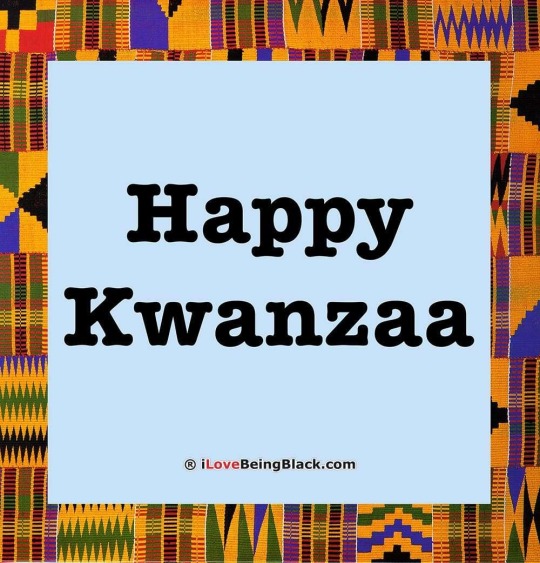
Happy Kwanzaa!
#Kwanzaa is an African American and Pan-African holiday which celebrates family, community and culture. Celebrated from December 26th through January 1st, the origins are in the first harvest celebrations of Africa from which it takes its name. The name Kwanzaa is derived from the phrase "matunda ya kwanza" which means "first fruits" in Swahili, a Pan-African language which is the most widely spoken African language.
Each day is started with this greeting: Habari Gani - What is the news? The reply is the ‘Nguzo Saba’ (principle) for that day. They are listed in order here:
Umoja - Unity
Kujichagulia - Self Determination
Ujima - Collective Work & Responsibility
Ujamaa - Cooperative Economics
Nia - Purpose
Kuumba - Creativity
Imani - Faith
The first-fruits celebrations are recorded in African history as far back as ancient Egypt and Nubia and appear in ancient and modern times in other classical African civilizations such as Ashantiland and Yorubaland. These celebrations are also found in ancient and modern times among societies as large as empires like the Zulu kingdoms (Swaziland) or smaller societies and groups like the Matabele, Thonga and Lovedu, all of southeastern Africa. Kwanzaa builds on the five fundamental activities of Continental African "first fruit" celebrations: ingathering; reverence; commemoration; recommitment; and celebration. Kwanzaa, then, is:
• a time of ingathering of the people to reaffirm the bonds between them;
• a time of special reverence for the creator and creation in thanks and respect for the blessings, bountifulness and beauty of creation;
• a time for commemoration of the past in pursuit of its lessons and in honor of its models of human excellence, our ancestors;
• a time of recommitment to our highest cultural ideals in our ongoing effort to always bring forth the best of African cultural thought and practice; and
• a time for celebration of the Good, the good of life and of existence itself, the good of family, community and culture, the good of the awesome and the ordinary, in a word the good of the divine, natural and social.
Kwanzaa was established in 1966 in the midst of the Black Freedom Movement and thus reflects its concern for cultural groundedness in thought and practice, and the unity and self-determination associated with this. It was conceived and established to serve several functions.
Finally, Kwanzaa is a cultural holiday, not a religious one, thus available to and practiced by Africans of all religious faiths who come together based on the rich, ancient and varied common ground of their Africanness.
Courtesy of:
http://www.officialkwanzaawebsite.org/origins1.shtml
1 note
·
View note
Note
!!!! Ant anon here!!! There actually is a species of ant that hisses!! They kind of squeak a little too! They’re called Matabele ants and they sound fascinating, kind of like a quiet version of when you go out in a forest in the night and there’s all those big sounds! Here’s an audio of the hissing ants, you might need to turn your audio up but they’re very cool and their gastors look very neat too!!
https://m.youtube.com/watch?v=NkWreBIipIs
[Min's eyes widen, and he bounces a little]
Woah! That's so neat; I didn't know that!
2 notes
·
View notes
Text
Savaşın Evrimi: Birinci Matabele Savaşı'ndan Otonom Sistemlere
Birinci Matabele Savaşı: Tarihsel Bir Önsöz
1893 ve 1894 yılları arasında gerçekleşen Birinci Matabele Savaşı, askeri tarihte önemli bir anı işaret ederek savaşları yeniden şekillendirecek dönüşümlerin habercisi oldu. Savaşın ilk çatışmasında, yaklaşık 700 asker, paramiliter ve İngiliz Güney Afrika Şirketi ile müttefik Afrika yardımcı birlikleri beş Maxim silahı konuşlandırdı; tarihin ilk tam…
0 notes
